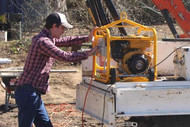Troubleshoot for Common Generator Problems
5th Jun 2022
This troubleshooter guide has been created with common generators problems found with most generator models. However, many of the issues are shared by portable generators. Also note that we always recommend the support of professionals when attempting to fix a generator, to ensure your warranty and safety.
Generator Won’t Start
One of the most common issues, particularly for standby generators, is that it simply won’t start. There are so many reasons why your generator may not be kicking into gear, which is why regular testing is hugely important.
Here are some of the most common causes you should check first.
Lack of Fuel
This point is particularly important for portable generators. If you haven’t used your generator in a while, make sure there’s enough fuel. Ensuring it is topped up with high-quality fuel can help it start up more smoothly.
If a generator has been left unused for a while, fuel can become clogged or contaminated. You should always check that water or any other contaminant has not entered the fuel or filtration system.
Low Battery
Another issue when generators have been asleep for an extended period is the battery. Start-up issues are often caused by weak or low batteries.
If you think the battery could have died, you can look to jumpstart your generator. Even a well-maintained battery will deteriorate over time so you may need to consider buying a new battery.
Leaks
If you come across an oil, fuel or coolant leak, this could be the reason behind your generator’s inability to start.
Often the best way to deal with a leak is to immediately get in touch with an expert so they can patch any holes or make the necessary repairs and advise you on further action.
Carburettor
The carburettor is something that, as you will discover, frequently appears in this troubleshooter. It is an essential but delicate piece of the generator’s combustion system that, once worn down over time, can cause numerous issues.
Sometimes, the carburettor can become clogged by old fuel, preventing the generator from being able to start up. Using a carburettor cleaner can help remove any old fuel and get your generator up and running.
Other Potential Faulty Parts
If your generator won’t start, other things to consider include the spark plugs and ignition coils. If these are worn or damaged, the engine won’t start. Another potential issue is faulty switches, such as safety or start switches that aren’t functioning.
Generator Starts but Doesn’t Continue Running
If your generator starts but quickly stops, the most common cause is the carburettor. As with above, any clogging could cause the carburettor to fail, so the first port of call should always be cleaning it with a specialist cleaner. You may also want to renew the fuel, starting afresh.
If the carburettor is clean but the problem persists, it could be down to two potential causes. One is a power overload – if your generator isn’t big enough to deliver the expected voltage, it might cut off. If you think this is the issue, you may need to upgrade your generator or lower the pressure.
The second potential issue is a clogged fuel cap. The fuel cap includes a small vent which allows a bit of air into the tank as fuel is used. If the cap is blocked, no air can pass through, creating a vacuum effect which can stop fuel flow, despite there being fuel in the tank.
To test this issue, run the generator with the fuel cap slightly loosened. If it runs smoothly, you may need to replace the cap.
Generator Battery Keeps Dying
Generator batteries work through a system of self-charging – as the generator produces power, some of the power feeds back into the generator system to keep it running. If your battery keeps dying, it’s likely to be a fault of this internal system. This will usually mean that any potential fixes will involve complete or at least partial replacement.
The first thing to look at is the voltage regulator, which is responsible for sending voltage to the battery. If it’s defective, the battery will continue to die due to lack of power.
Another potential cause is the alternator, which is the component that transforms energy into electricity. A multimeter can be used here to check whether the alternator is producing a continuous flow for the voltage regulator.
Maximising Battery Life
Regularly checking your generator and performing basic maintenance tasks is one of the best things you can do ensure all the components are fully functional. To ensure your battery lasts as long as possible and doesn’t keep dying, make sure it is not being overexerted or used for inappropriate application.
Monitor your battery and maintain it by following the manufacture’s guidelines so it will be less likely to give you problems.
Generator Running but No Voltage Output
What do you do when your generator is seemingly running smoothly but isn’t producing any power? This issue is common in smaller standby generators and has many potential causes, such as a blown fuse, defunct voltage regulator or problems with the alternator.
The most common cause for generators not producing power, however, is the alternator losing its residual magnetism.
Without going into too much detail, generators use a magnetic field as part of their energy production. When the generator stops, a small magnetic field remains, which helps the generator produce power when it restarts.
If a generator is left switched off for too long, this residual magnetism can be lost, especially if its left connected to a load. Repairing this issue can be complicated, so a professional’s support is highly recommended in this case.
Generator Experiences Surging
If your generator surges, it gives fluctuations in power output, often manifesting in bulbs that are brightly lit one minute and dim the next. There are several reasons why this kind of power irregularity might happen.
One possible culprit behind this issue is problems with your fuel, whether this is the fuel level or its quality. Make sure that you are always using the right type and amount of fuel that is appropriate for your generator.
Surging can also be caused by a faulty capacitor – when a capacitor starts failing, because of age or poor maintenance, it can cause issues with power regulation and distribution.
Another factor to consider when investigating problems with surging is the age of your generator. Although good maintenance can do wonders to help boost your generator’s efficiency and extend its life, generators do not last forever. Replacement may be necessary if surging persists after other potential avenues have been exhausted.





